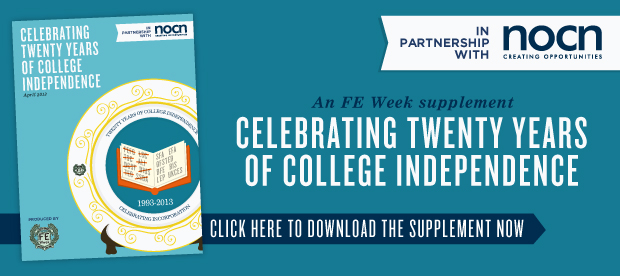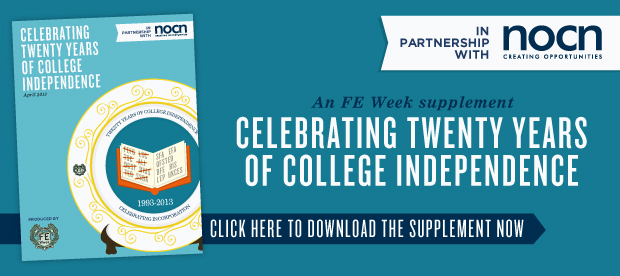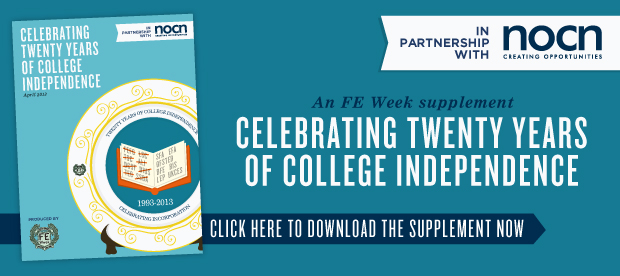Incorporation as the start of a challenge, not the end of one
The journey to college self-improvement needs at least three to five years without political intervention, says Martin Doel (pictured), chief executive of the Association of Colleges.
“I’m one of life’s optimists,” he insists. “We can achieve this through New Challenges, New Chances, which gives at least the prospect of ‘re–Incorporation’ after a period where we saw many central controls reintroduced.”
But he is also a realist and knows there has to be a trade-off. Doel reckons it was a big mistake to see Incorporation in 1993 as “the end of a journey”, rather than a beginning. Ken Clarke, then Education Secretary who saw the 1992 Further and Higher Education Act through Parliament, told colleges they were free and said: “Let 100 flowers bloom.”
And how they bloomed; until the spectacular scandal of mismanagement at Derby College, Wilmorton. The Shattock inquiry painted an extraordinary picture of negligence and an attempted cover-up at a college spending an annual £10m of taxpayers’ money on outlandish ventures such as Oscars, a city centre nightclub.
The chair and three governors quit, as the board was accused of failing to curb an impetuous principal.
Subsequently, a new funding formula led to a franchising bubble that ended in 1999 with inquiries at Halton and Bilston. The whole sector was tarred with the brush of negligence and freedoms were curtailed.
“How you exercise freedom and how that develops should have been seen as the start of a journey,” says Doel. And at the start is where the sector is now, he says, after “the journey was further delayed by the Learning and Skills Council (LSC) silos and bureaucratic controls”.
And so to the trade-off: “We must make sure this time that we give no one any excuse for arresting that journey. Also, the government needs the courage of its convictions, rather than stop us prematurely as the City Deals and local enterprise partnerships (LEPs), etc, develop, all of which could be seen as reasons to take away freedoms before they’ve had time to fully develop.”
But if LEPs turn out to be no different to the training and enterprise councils of the 1990s, which often overlaid work colleges did rather than call on them, much will be lost.
“This won’t happen if what we see in New Challenges, New Chances is allowed to happen but, as I’ve said before, this needs three, possibly five, years to develop. That is where the FE Guild comes in,” he says.
“It needs to be here in five years’ time to help make teaching and learning as good as it can be, and to help professionals define them, rather than have others come in and tell us what to do.”
There is also the need to develop good leadership and governing bodies competent in their roles and responsibilities to the community if the sector is to avoid any Wilmorton or franchising abuse revival.
Dame Ruth Silver, chair of the Learning and Skills Improvement Service, emphasised this point in recent FE Week supplement Effective Leadership and Governance.
“A college governing body has to take care of the college so that it is of service to the local community, which sometimes means doing things that are difficult for the college,” she said.
Colleges may be in a different place compared with 1993, but that is no cause for complacency. Back to Doel, who says: “The guild won’t do it on its own. The institutions will, but the guild must facilitate and help colleges to make the most of this journey.”
He sees three priorities. First, that governing bodies challenge their executive and staff to improve teaching and learning, and have methods to check progress.
Second, see how colleges meet the needs of students and employers. And finally, check finances are healthy.
“We are in a strong position to develop and secure reincorporation despite the austerity — if we keep improving,” he says.








